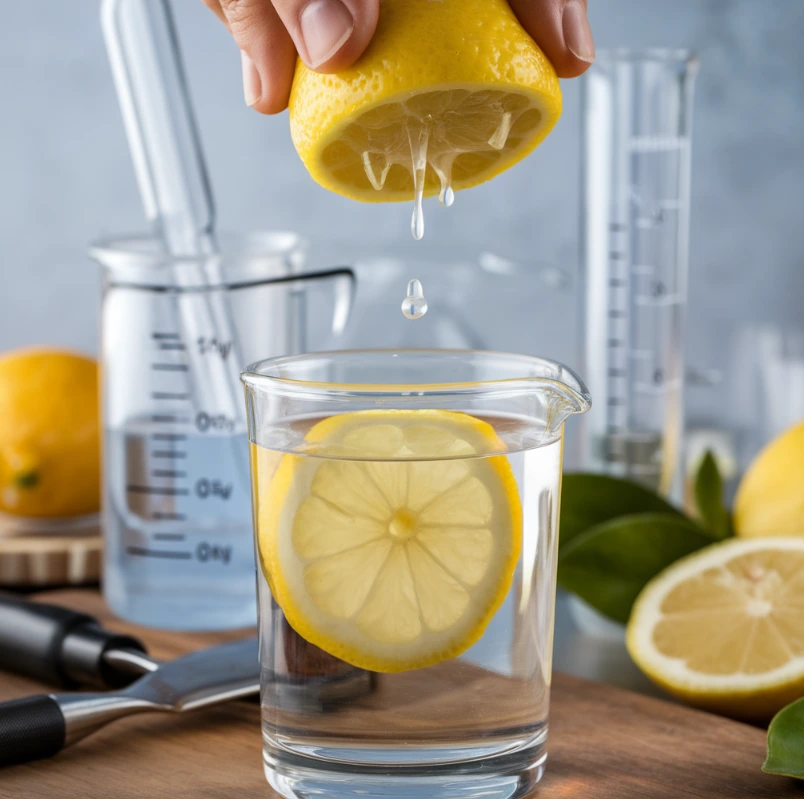Lemon juice is a household staple admired for its zesty flavor, health benefits, and versatility in cooking and cleaning. However, beyond its culinary and cleaning applications, lemon juice offers a fascinating exploration of chemistry. For example, have you ever wondered, what type of ion is lemon juice? This article dives into the unique chemical composition of lemon juice, explores its uses, and explains how its ionic nature impacts daily life.
The Chemistry of Lemon Juice

At its core, lemon juice primarily contains citric acid, a weak organic acid responsible for its distinct tangy taste. In fact, when dissolved in water, citric acid dissociates to release hydrogen ions (H⁺), making lemon juice an acidic solution. The pH of lemon juice typically ranges between 2 and 3, highlighting its high acidity.
Some of the key ions found in lemon juice include:
- Hydrogen Ions (H⁺): Responsible for its acidity and sour taste.
- Citrate Ions (C₆H₅O₇³⁻): Derived from citric acid, these ions stabilize the solution.
- Potassium (K⁺) and Calcium Ions (Ca²⁺): Trace minerals that add nutritional value.
Moreover, balancing acidity is critical for recipes such as macaroni and cheese, which rely on acidic ingredients like lemon juice to enhance taste.
How Lemon Juice Ions Affect Acidity
Acidity in a solution like lemon juice is primarily driven by the concentration of hydrogen ions (H⁺). In addition, this abundance of free hydrogen ions is why lemon juice acts as a natural acidifier in recipes and cleaning products. However, although acidic outside the body, lemon juice is metabolized into alkaline components, often promoted in alkaline diets. Consequently, its dual nature makes it a versatile ingredient.
Why Understanding Lemon Juice Ions Matters
For example, the ionic composition of lemon juice plays a crucial role in its diverse applications, making it more than just a kitchen staple. Its significance goes well beyond scientific curiosity, as its properties bring value to various aspects of daily life, including health, cleaning, and cooking.
Health:
The hydrogen ions in lemon juice actively contribute to better digestion by stimulating the production of stomach acids, which help break down food efficiently. Moreover, lemon juice helps maintain a balanced pH in the stomach, preventing common issues like acid reflux or indigestion. In fact, this is one reason why it is often recommended as part of a morning wellness routine. Its health benefits extend to other acidic foods as well, such as those found in dishes like broccoli salad, which pair well with lemon juice for improved nutrient absorption.
Cleaning :
- : Lemon juice’s ions, especially citrate ions, effectively interact with grease, grime, and tough stains. In addition, its natural antibacterial properties make it an ideal eco-friendly alternative to chemical cleaners. Whether used for cleaning glass surfaces, polishing metals, or removing rust, lemon juice offers a versatile, safe solution for natural cleaning enthusiasts. For instance, its use in household cleaning minimizes exposure to harmful chemicals while delivering excellent results.
- Cooking: Lemon juice’s acidic ions are invaluable in cooking, balancing flavors and tenderizing meats by breaking down tough protein structures. For example, it is a key ingredient in marinades for dishes like marinated chicken, where it not only enhances taste but also improves texture. Moreover, its acidity helps stabilize emulsions in sauces and dressings, ensuring a smooth and creamy consistency. As a result, chefs and home cooks alike rely on lemon juice to elevate the flavor profiles of countless dishes.
In conclusion, understanding what type of ion is lemon juice allows you to fully appreciate its wide-ranging benefits and make the most of this versatile ingredient. By unlocking its potential, you can enhance your health, adopt sustainable cleaning practices, and create exceptional culinary experiences.
Creative Uses of Lemon Juice Ions
1. Health and Wellness
The hydrogen ions in lemon juice not only create its signature sour taste but also provide significant health benefits. For example, the vitamin C in lemon juice strengthens the immune system, supports skin health, and helps combat free radicals that can damage cells. Additionally, its unique ionic composition enhances the absorption of iron from plant-based foods, making it an excellent pairing with dishes like spinach or lentil salads. In fact, these properties explain why lemon juice is a staple in many detox and health-boosting routines. Understanding what type of ion is lemon juice reveals how its acidity supports digestion and balances stomach pH, contributing to overall wellness.
2. Eco-Friendly Cleaning

The ions in lemon juice, particularly citrate ions, make it an exceptional natural cleaning agent. For instance, when combined with baking soda, lemon juice produces an effervescent reaction that lifts stains and dissolves grease with ease. Moreover, its acidic nature makes it highly effective for a variety of cleaning tasks, such as:
- Cleaning glass surfaces: Achieve streak-free windows and mirrors.
- Removing rust stains: Lemon juice reacts with rust to dissolve it, restoring tarnished surfaces.
- Polishing copper and brass: Its natural acids restore the shine of these metals, leaving them spotless.
Similarly, using lemon juice as a cleaner is a sustainable and eco-friendly choice, ideal for homes aiming to reduce their reliance on chemical products. Learn more about natural cleaning methods in our eco-friendly recipe guide.
3. Culinary Masterpiece

Lemon juice plays a crucial role in cooking by enhancing flavors and adding balance to a variety of dishes. For instance, its acidity brightens up marinades, sauces, and dressings, elevating the taste of meats, vegetables, and salads. Its ionic properties break down proteins, tenderizing meats for grilling or roasting. In addition, lemon juice helps stabilize emulsions, ensuring creamy textures in dishes like lemon butter sauce or vinaigrettes.
As a result, lemon juice is beloved by chefs and home cooks for its versatility and ability to transform recipes. Whether you’re experimenting with savory dishes or sweet treats, check out our culinary tips and tricks for more ways to incorporate this powerhouse ingredient into your meals.ing its unique flavor into your meals, check out our culinary tips and tricks. As a result, lemon juice continues to be a favorite among home cooks and professional chefs alike.
People Also Ask
Does lemon juice go bad?
Yes, lemon juice can spoil when microbial growth occurs due to improper storage. For example, exposure to air, light, or heat accelerates spoilage, altering its taste, smell, and texture. In addition, storing lemon juice in a sealed container in the refrigerator keeps it fresh for several days and prevents microbial activity.
Can lemon juice expire?
Yes, bottled lemon juice has an expiration date that indicates its best quality period. However, fresh lemon juice without preservatives lasts only a few days in the refrigerator. Moreover, you can slow its natural degradation by storing it in an airtight container, which minimizes exposure to oxygen.
Does lemon juice have electrolytes?
Yes, lemon juice contains electrolytes like potassium (K⁺) and calcium (Ca²⁺), which are crucial for hydration and bodily functions. For instance, drinking lemon water helps replenish electrolytes and supports overall health. In fact, this natural source of electrolytes makes lemon juice an excellent addition to healthy beverages.
FAQs About Lemon Juice Ions
What makes lemon juice acidic?
The dissociation of citric acid, a primary component in lemon juice, releases hydrogen ions (H⁺) when dissolved in water. As a result, these ions lower the pH level and contribute to the acidity of lemon juice. In addition, this characteristic acidity plays a vital role in its functionality, whether it’s used for cleaning or enhancing recipes. Understanding what type of ion is lemon juice can further clarify why it performs so effectively in various applications.
Why does lemon juice taste sour?
The sour taste of lemon juice is directly linked to the high concentration of hydrogen ions. These ions activate sour taste receptors on the tongue, producing the sharp tanginess that lemon juice is famous for. Moreover, this acidic profile not only influences its taste but also makes it a valuable addition to dishes that require a bright, zesty flavor to balance other ingredients.
How does lemon juice clean surfaces?
Lemon juice cleans surfaces through the action of citric acid, which effectively breaks down grime, grease, and stains. For example, when applied to metal or glass, citric acid reacts with residues to dissolve them, leaving surfaces clean and shiny. Additionally, its natural antibacterial properties make it a safe and eco-friendly alternative to chemical cleaners. In short, the powerful ionic composition of lemon juice is what makes it a versatile cleaning agent.
Conclusion
Lemon juice is more than just a flavor enhancer—it is a scientifically fascinating substance defined by its ions, including hydrogen, citrate, and potassium. In short, these ions play a pivotal role in its diverse applications across health, cleaning, and cooking. Understanding what type of ion is lemon juice helps you unlock its full potential, whether you’re using it to add a tangy zest to your recipes, clean stubborn stains naturally, or benefit from its health-enhancing properties. Finally, by appreciating the ionic nature of lemon juice, you can better incorporate this versatile ingredient into your daily life. Explore more about natural ingredients and recipes at TastyNiche, and in conclusion, for additional culinary inspiration, visit Tasty.co, AllRecipes, and Delish!

